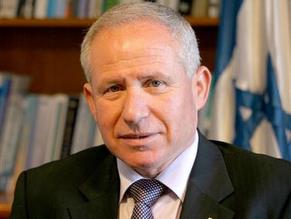|
World Jewish News

Avi Dichter, a Kadima member of the Knesset: ''It is wrong to call the “earthquake” in the Middle East the “Arab Spring.
|
Members of Israel’s parliament warn of Iran's nuclear threat in talks at NATO headquarters
15.12.2011, Israel and the World Further economic sanctions against Iran’s nuclear program will only delay this country in its efforts to build a nuclear bomb but it will not stop it, Avi Dichter, a member of the Knesset, Israel’s parliament, said Tuesday.
Dichter, a member of the Kadima opposition party, visited Monday the North Atlantic Treaty Organization (NATO) headquarters in Brussels along with five other members of the Knesset’s foreign and security committee belonging to various political parties.
Besides a discussion with NATO officials on how the 28-member organization works and on expanding the cooperation with Israel, the parliamentarians warned the alliance of the dangers of a nuclear Iran not only as an existential threat for the State of Israel but also for all the free world, and expressed their fears about the rise of Islamist governments in various Arab countries.
"Iran is not only developing a nuclear bomb but also missiles with a range of 2,500 kilometers, which represents two times the distance from Iran to Israel," Dichter told several journalists before returning to Israel.
"Moreover Iran is behind a conventional threat through its proxies, Hezbollah in Iran and Hamas, an offshoot of the Muslim Brotherhood, in Gaza," the former head of Israel's Shin Bet security agency said.
He believes that it was wrong to call the "earthquake" in the Middle East the "Arab Spring." "It is everything but not a Spring because it has led to radical elements being strengthened,” he said, mentioning in particular the recent victory of the Moslem Brotherhood and of the "mad" Salafists at elections in Egypt.
While he thinks that the fall of Syrian’s President Bashar el Assad "is only a matter of time," Dichter said that Jordan, Morocco and even Saudi Arabia might also be hit by the upheaval.
"A democratic system is not only going to vote," said Moshe Matalon from the Israel Beiteinu party. "It has also to do with culture and education".
"Now NATO and Europe understand that Israel is the sole place of stability in the region," said Kadima MK Orit Zuaretz.
But Aryeh Eldad, of the National Union, doesn’t understand why NATO is not intervening in Syria nor in Iran. "This is very worrying," he said.
Israel is a member of NATO’s Mediterranean Dialogue, which was initiated in 1994, along with six other non-NATO countries of the Mediterranean region: Algeria, Egypt, Jordan, Mauritania, Morocco and Tunisia.
EJP
|
|
